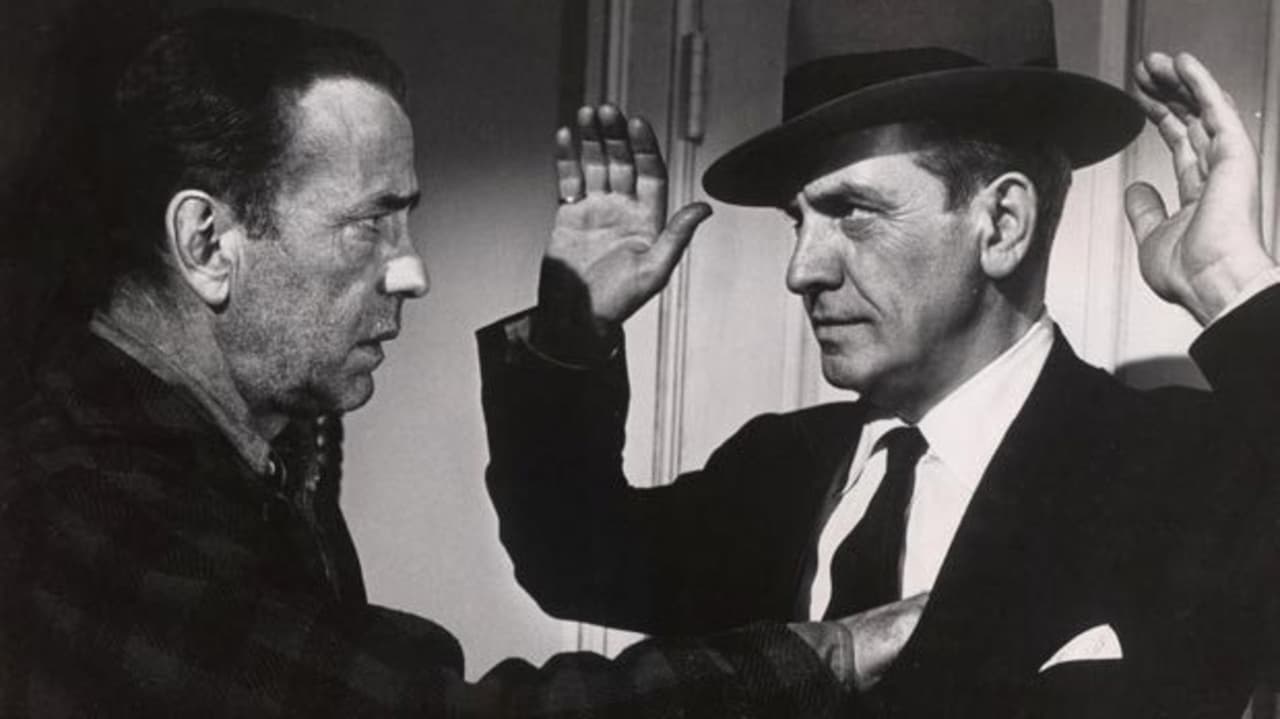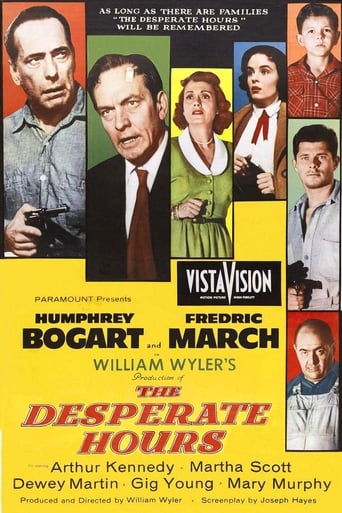

Most undeservingly overhyped movie of all time??
... View MoreIt's a mild crowd pleaser for people who are exhausted by blockbusters.
... View MoreThe film creates a perfect balance between action and depth of basic needs, in the midst of an infertile atmosphere.
... View MoreThis movie feels like it was made purely to piss off people who want good shows
... View MoreThere are few plays or musicals from the Broadway stage that end up becoming a Hollywood film the very same year, but one of those rare examples is the Tony Award winning play "The Desperate Hours" which spawned several imitations on film the very same year, most obviously "The Night Holds Terror". But as well done as the imitator was, it is the original that deserves praise, giving Humphrey Bogart his most sinister sociopathic criminal since "The Petrified Forest" and giving fellow Oscar Winning actor Frederic March an equally good role to sink his teeth into as the patriarch of the family whom escaped convicts Bogart and his gang terrorize. Martha Scott, an underrated actress of stage, screen and TV, best known for character parts (in spite of a leading lady career of such classics as the original film version of "Our Town" and "Cheers For Miss Bishop") plays his terrified, but ultimately brave wife, determined to do everything she can to protect teenaged daughter Murphy and precocious pre-teen son Richard Eyer. She even risks her own life at one point in a powerful scene where her frustration takes over her common sense.Bogart's fellow escapees include his younger brother (Dewey Martin) and the coarse Robert Middleton, a large human monster who seems to take glee in the terror he poses on his victims, and in one of the more horrific scenes, drives an innocent elderly junk man to a presumed death. The terror on the junk man's face is powerful, briefly overcome by the determination to survive, and from that moment on, the audience is in the grips of the desire to see Middleton's character disposed of in the most violent of ways. Martin is a bit more sympathetic and gentle than his brother and Middleton, at one point stopping Middleton from attacking the attractive Murphy. But he's as much in this as the other two escapees, so his fate is sealed as far as the audience's desire is concerned. Bogart is the smartest of the trio, utilizing every precaution to ensure their survival, and suspicious of every little move that the family they are holding hostage (while still allowing them to go through their outside daily routines with the knowledge that housewife Scott will be in peril if anything should arise) to the point of even checking out Eyer's homework project just on the suspicion that he should be trying to alert his teacher to their situation.The always outstanding March delivers another fierce performance, at one point telling his concerned secretary (Helen Kleeb) to mind her own business when she expresses concern over his apparent nervousness. Murphy's boyfriend (Gig Young) becomes concerned over her sudden distance, even on a date, while a local cop (Arthur Kennedy) who was involved in Bogart's initial arrest, nervously fidgets during these desperate hours with the knowledge that Bogart will be coming after him for Kennedy's having struck and scarred Bogart with the butt of his gun when arresting him. The little details all add up to make a truly intense hour and a half of gripping terror that showed society at its worst. The fact that this is an apparently true story makes it all the more suspenseful, brilliantly written for the screen by its own playwright Joseph Hayes and superbly directed by the legendary William Wyler. Pretty much everything about this film is outstanding. I originally saw this as a double bill with the same year's "We're No Angels" (also from Paramount) where Bogart played a more comical prison escapee who hides out in the home of store owners unaware of whom they are playing host to. The common denominator between the two films of the lives of escaped convicts has stood the test of time with me, so it is difficult to think of one film without thinking of the other.
... View MoreDaniel C. Hilliard (Fredric March) is the head of a suburban nuclear family. Ellie is the stay-at-home mom. Teen Cindy is dating Chuck Wright. Ralphie is the rambunctious son. Escaped convict brothers Glenn (Humphrey Bogart) and Hal Griffin along with the destructive Simon Kobish find Ellie home alone and take over. As the family returns, they are all taken hostage as Glenn waits for his money and girlfriend. The situation gets extended into days as the police net widens and the gang blackmails the family to maintain an outward appearance of normality.Bogie often played vicious gangsters or roguish heroes. In this one, he plays the criminal comfortably. March as the father is a little too outwardly defiant even as he submits to Glenn. It's hard to believe that Glenn doesn't tie the boy and the mother up especially after the first revolt attempt. That part kept gnawing at me all the way through the movie. Overall, this is workable thriller with solid actors.
... View More"The Desperate Hours" is about a randomly chosen family held hostage by three escaped criminals. The Hilliard family is an upscale "Typical American Family" whose home is suddenly taken over by Glenn Griffin (Humphrey Bogart), his brother Hal (Dewey Martin) and the brutish Sam Kobish (Robert Middleton).The father Dan Hilliard (Fredric March), mother Ellie (Martha Scott), daughter Cindy (Mary Murphy) and son Ralphie (Richard Eyer) are living in fear for their lives at the hands of the convicts. It seems that Glenn Griffin is out for revenge against the cop who arrested him years earlier (Arthur Kennedy).Producer William Wyler creates a suspenseful couple of days within the Hilliard household. The family is allowed to function normally with Dan and Cindy going to work and Ralphie to school while Ellie remains at home the prisoner of the men. Cindy's boyfriend Chuck Wright (Gig Young) suspects that something is wrong. Dan is forced to comply with Griffin's demands in order to protect his family.This film is arguably the best of Bogart's later films. His character of Glenn Griffin is not unlike his portrayal of "Duke" Mantee in "The Petrified Forest" (1936) where he holds a group of people hostage in a remote diner. I believe that Spencer Tracy was originally supposed to play the March role but withdrew due to illness.Although both March and Bogart were a little too old for their respective roles the scenes between them are electric as each tries to outsmart the other. The character of the daughter Cindy is supposed to be 19 years old so you might say that Gig Young in his forties at the time, was also too old to be her boyfriend. Minor faults as the actors convincingly carry off their respective parts.Others in the cast include Alan Reed, Ray Teal, Ray Collins and Whit Bissell as various cops and Beverly Garland, Joe Flynn and Burt Mustin in smaller roles.An excellent thriller.
... View MoreThe Desperate Hours is directed by William Wyler and adapted by Joseph Hayes from his own novel. Loosely based on real events, it had previously been a Broadway production. It stars Humphrey Bogart, Fredric March, Martha Scott, Dewey Martin, Gig Young, Arthur Kennedy, Mary Murphy, Richard Eyer and Robert Middleton. Out of Paramount Pictures, it is the first black and white picture filmed in VistaVision with photography by Lee Garmes and music by Gail Kubik.Three escaped convicts take refuge at the suburban home of the Hilliard's, holding the family captive at gunpoint. But as the hours tick past, the three men start to come apart just as the Hilliard father begins to gain in confidence.An excellent, if a touch too long, siege drama tinted with film noir traits, The Desperate Hours asks us to feel the fear of home invasion at the hands of someone sick or desperate. To which Wyler and company achieve their aims. Most of the action operates out of one claustrophobic location, giving the picture a sweaty edge, which when coupled with the exterior shots that paint a harmonious picket fence Americana, dials us into some 1950s paranoia. The three criminals dynamic, the conflict within, is what puts the picture into the film noir arc, particularly with the leader Glenn Griffin (Bogart), who is losing his grip on all in the house by the hour. The rest is pure melodrama, but riveting and capable of having one perched on the edge of the seat.With two Best Actor Oscar winners in the cast, it's perhaps no surprise that the acting is high quality, with both Bogart (intense and moody) and March (two-fold characterisation of the father with a great transitional shift late on) reason enough to watch the film. Wyler, who also produces, has good sense for a stifling mood, and his action construction is high energised and thrilling, while to round things off the production value is mostly high. Some passages could have (and should have) been trimmed to cut the running time down to maybe an hour and half, and it does come close to being too stagy at times. However, film remains compelling throughout and it's very much a must see for fans of great classical acting and siege based dramas. 7/10
... View More